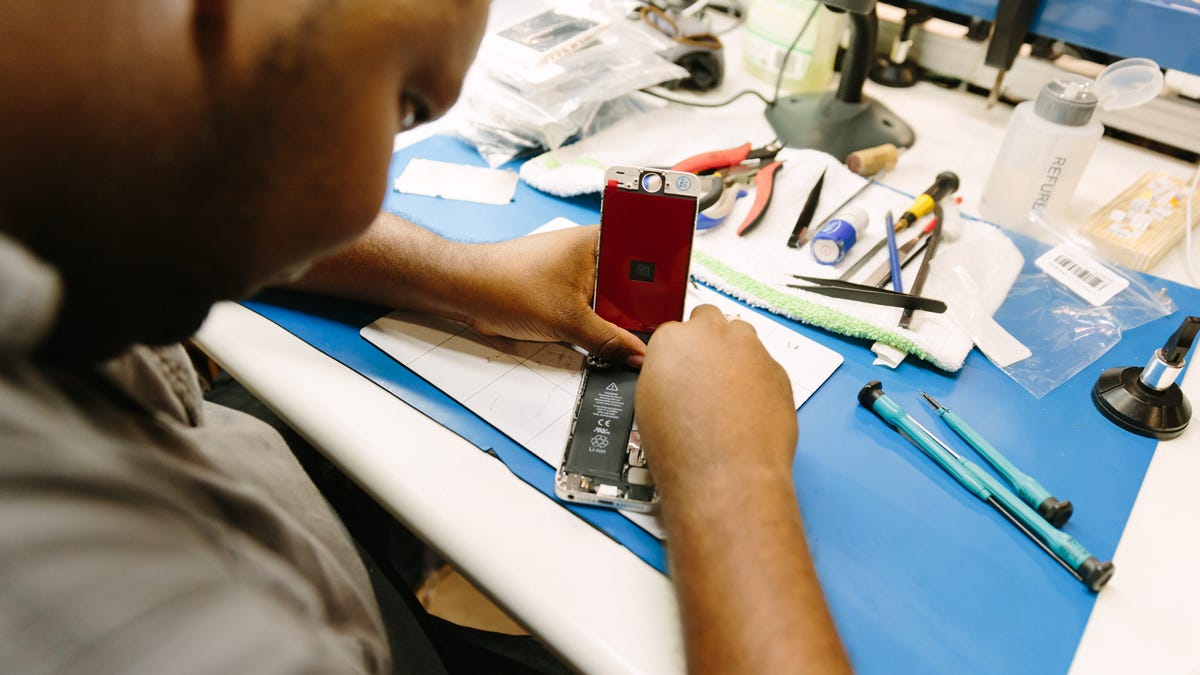That used iPhone? Here's what happens before you buy it
CNET takes you behind the scenes of Gazelle's factory, where hundreds of thousands of used iPhones are processed each year before they are resold.
When it came time for Caleb Gonsalves to buy a new iPhone earlier this year, he didn't run to the nearest Apple store. Instead, he headed to the website of reseller Gazelle to search for a used iPhone 6, saving himself money and the pain of waiting another year for his wireless contract to end.
"The idea I could just sell back a phone [an iPhone 5S]...and put the money to a new phone that was discounted...was amazing," said Gonsalves, a 27-year-old executive at a tech startup based in Boston.
He ended up trading in a 32-gigabyte iPhone 5S for $216 and applied the cash to help pay for a used 64GB iPhone 6 from Gazelle that cost $401. At the time, a new version of that phone would have cost $749.
Gonsalves isn't alone when it comes to buying and selling used phones online.
As the US wireless market moves away from traditional two-year contracts, more consumers are upgrading their phones at a faster clip, while looking for ways to do it on the cheap. Device resellers like Gazelle are benefiting from that trend by offering affordable alternatives in used smartphones. Since the iPhone 6S hit the market in late September, about 100,000 iPhones have been traded in to Gazelle, a level in line with the typical trade-in number during "S" generations, the company said. Apple tends to do major redesigns every other year, opting for more subtle changes in the off-year denoted by the "S" in the product name.
Most of Gazelle's business revolves around the iPhone, but it also buys and sells Android devices. And it's not the only company in this market. eBay, uSell and various other companies also have businesses related to used mobile devices.
Gazelle, based in Boston, got its start offering consumers a place to sell their old or unwanted electronic wares. Last year it opened up an online storefront to sell them back to you, and it has since moved 50,000 iPhones.
"As subsidies have been taken away from carriers, folks are realizing their iPhone habit is a $650 habit, not $200," Gazelle Chief Marketing Officer Sarah Welch said. "There has been an explosion in demand for high-quality used phones."
To see what happens to those iPhones before they reach new buyers' hands, CNET visited Gazelle's facility in Louisville, Kentucky, for a behind-the-scenes glimpse.
To sell a smartphone, consumers go to Gazelle's site and describe the phone's condition as "broken," "good" or "flawless" and then receive an estimate for its value. The company then sends a prepaid box to the consumer, who has 30 days to return it with the phone to the Louisville facility. The long window allows sellers to lock in a high price before the newest iPhone is announced, but gives them time to upgrade before sending off the old phone.
Gazelle tests 30 different features on iPhones it receives before selling them to consumers.
"It's just quick and easy, a no-brainer," said Sarah van Overwalle, a 47-year-old interior designer from Fishers, Indiana, who has sold about four or five of her family's iPhones to Gazelle.
Once the arrive at the facility, the phones go through a "pretty rigorous inspection process," Welch said. The plant workers first use Gazelle's proprietary software to verify the device -- an iPhone 5S, for instance, instead of an iPhone 5 -- and make sure it's in the condition specified. Gazelle then verifies each component and aspect of the phone and checks the iPhone's serial number against a database to ensure it isn't stolen.
If it gets flagged, Gazelle contacts the person who traded in the phone to provide the opportunity to prove ownership. "More often than not we never hear from the customer again," Welch said. The company holds onto the iPhone to give law enforcement the ability to contact Gazelle and reclaim the phone, but that doesn't happen very often.
Gazelle also alerts the seller if the phone is in a different condition than specified. Sometimes the iPhone is actually better than promised and consumers get more money. Other times, it's not the correct model or isn't in good shape, and Gazelle lets the sellers decide if they want to accept a lower amount or if they want the device back, free of charge.
Phones that are sold directly to consumers by Gazelle go through an even more rigorous inspection process with 30 parameters. The screen is inspected to make sure it doesn't have too many scratches, the camera and microphone are tested and the battery is inspected to be sure it holds a charge. Gazelle also does a complete data wipe and factory reset of the phone.
A "small subset" of iPhones can be sold "as is," the company said. Gazelle repairs others, sometimes by using components from other phones that were traded in, before selling them to consumers.
Gonsalves said he'll likely return to Gazelle for an iPhone 6S. After the latest iPhone was released, he made an appointment to buy one from Apple, but discovered he'd still have to wait in line for two-and-a-half hours.
"I didn't do it," he said. "If I'm going to wait a month anyway, why not wait until it's cheaper [from a company like Gazelle]?"


